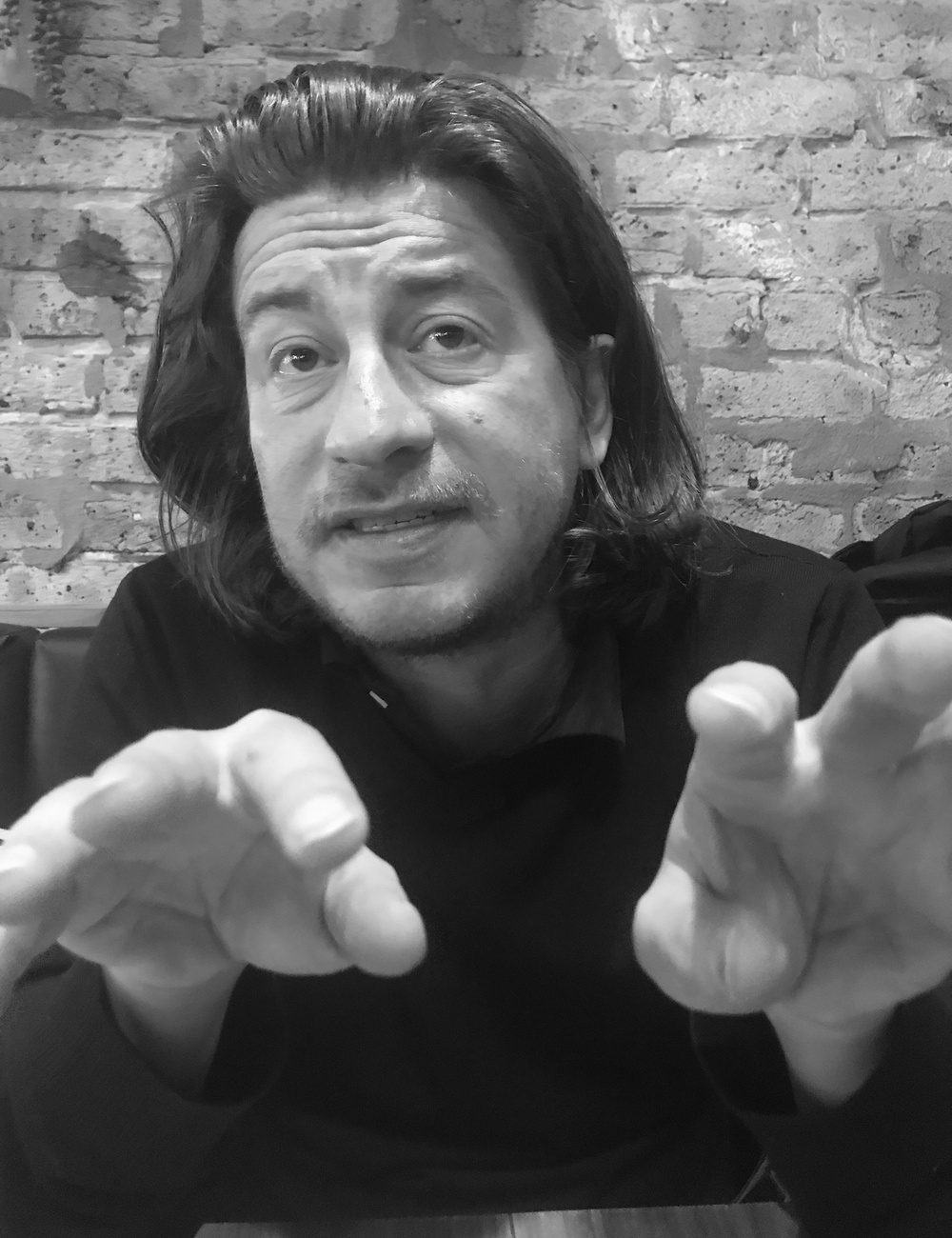 It’s 1945. World War II ended in May. Now it’s November.
It’s 1945. World War II ended in May. Now it’s November.
In a small town on the outskirts of Hungary, there’s a celebration, a wedding day. But there’s a cloud of smoke hanging over the occasion. Those who benefited from the spoils of war are waiting like the Jews once waited, for a knock on the door.
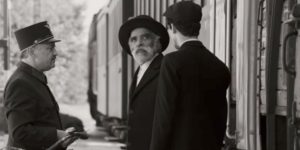 A friend saw “1945” and loved it. He told me the director was going to be at a few screenings. I like talkbacks, even though the discussion usually ends up being less about the director sharing his intention and more about someone in the audience falling in love with the sound of his own voice. Truth be told, I’m guilty of this crime, so needless to say, I was intrigued.
A friend saw “1945” and loved it. He told me the director was going to be at a few screenings. I like talkbacks, even though the discussion usually ends up being less about the director sharing his intention and more about someone in the audience falling in love with the sound of his own voice. Truth be told, I’m guilty of this crime, so needless to say, I was intrigued.
There’s good news and bad news. Then there’s really good news. I’ll lead with the good news.
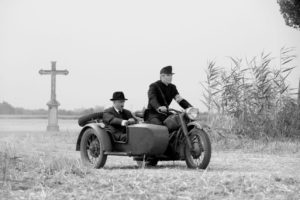 The showings with the director were sold out, which is good news for the film. The bad news is I didn’t get to attend the talkback. But the really good news is I saw a later showing and was so moved by the story, I reached out to the distributor, Neil Friedman of Menemsha Films, knowing the director was still in town and hoping I could find a way meet him. It worked. The dots were connected. I picked up Ferenc Török, the director of “1945.” He was staying in downtown Chicago at The Palmer House. I took him to Left Coast for lunch. Then drove him to O’Hare Airport to catch his flight to Budapest.
The showings with the director were sold out, which is good news for the film. The bad news is I didn’t get to attend the talkback. But the really good news is I saw a later showing and was so moved by the story, I reached out to the distributor, Neil Friedman of Menemsha Films, knowing the director was still in town and hoping I could find a way meet him. It worked. The dots were connected. I picked up Ferenc Török, the director of “1945.” He was staying in downtown Chicago at The Palmer House. I took him to Left Coast for lunch. Then drove him to O’Hare Airport to catch his flight to Budapest.
We jumped right in to an uncomfortable conversation, which at this moment in time is an act of revolution.
“You know,” Ferenc began, “if you lose somebody, you feel it is the worst day, the funeral day. But it is not. 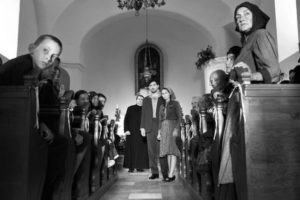 After 20 days, after 20 months, when she is missing, when he is missing. Is it possible to survive in this destroyed morality? Of course we want a new start for our history after the bombings and the concentration camps, maybe build up a new morality. But it’s impossible to take a border between the past and the present because the past is really important.”
After 20 days, after 20 months, when she is missing, when he is missing. Is it possible to survive in this destroyed morality? Of course we want a new start for our history after the bombings and the concentration camps, maybe build up a new morality. But it’s impossible to take a border between the past and the present because the past is really important.”
This isn’t a holocaust movie. No one is coming for the Jews. No one is shipping Jews in trains. There’s no list. There’s no Schindler. At this moment in time, Anne Frank’s diary is still lost in the rubble. It’s 1945, after the bombings have stopped, after the bodies on the beaches have been buried, after the concentration camps have been liberated, in the space where uncertainty is hanging in the air, where the fear of war has been replaced with the creeping paranoia of concealed injustice, it’s 1945…
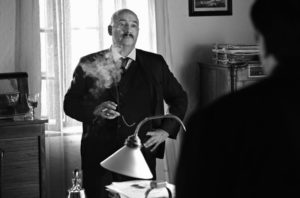 “The last 50 years was so positive. We celebrate the end of the war in Hungary, the Russian liberators, we get a big red flag against Nazis. So it’s only the positive elements. We singing together. We finish. We at peace,” Ferenc said. “But when we search in the documents, when we search in the photos, we recognize that period was horrible, maybe what happened before because the guilt and the paranoia and the schizophrenic situation of the society started with the big lie.”
“The last 50 years was so positive. We celebrate the end of the war in Hungary, the Russian liberators, we get a big red flag against Nazis. So it’s only the positive elements. We singing together. We finish. We at peace,” Ferenc said. “But when we search in the documents, when we search in the photos, we recognize that period was horrible, maybe what happened before because the guilt and the paranoia and the schizophrenic situation of the society started with the big lie.”
I stopped him. I took a few pictures. It’s impossible to get a director to relax in front of the camera. They want to control everything. But you can’t control everything. No one can, not really. 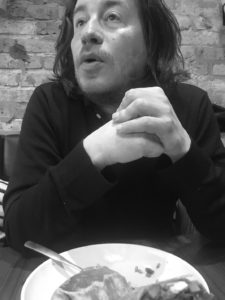 So if you snap a couple pictures, a control freak automatically stops talking, which is exactly what I wanted to happen. I wanted to stop Ferenc. I wanted him to crawl inside the big lie.
So if you snap a couple pictures, a control freak automatically stops talking, which is exactly what I wanted to happen. I wanted to stop Ferenc. I wanted him to crawl inside the big lie.
“The big lie,” he began. “Yeah, so. In history studies in high school or the university, they just talk about the positive elements. There’s no talk about the darkest parts, no reflection, no self-reflection of the society because the people afraid. The people start to believe a new religion in Hungary. Especially the communists. No nations. No religion. We need to follow something really special but we know it was a dream and economically it was an impossible dream. The freedom disappeared in the last minute.”
I stopped him again. Took a few more pictures. Ferenc was annoyed. But it was okay. I needed to slow down, to crawl inside the idea of freedom disappearing in the last minute.
“We need to live together with this past. Maybe our children’s generation, after 70 years, maybe will be the first, especially in Hungary, who can say I’m a Jew. 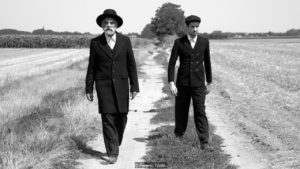 And it’s possible. 20 years ago, 50 years ago it was impossible to say this sentence.”
And it’s possible. 20 years ago, 50 years ago it was impossible to say this sentence.”
I asked Ferenc if he was Jewish.
“I’m not Jewish. I’m Christian. I’m not religious. But my family got a story. My uncle got ginger hair. You know? And all the time, we are the Jews of the streets. We are not. But we grown up with that kind of anti-Semitic feeling. But we never talk about it,” he said. “It was shame.”
I know shame. I’ve danced the shame dance. Step out of line, tweet out of turn, react and your reaction will be judged until you dance the shame dance. It hangs in the film, as everything is slowly pulled apart. I asked Ferenc if he was okay. The conversation was getting heavy. I could imagine he was sick of talking about heavy things, touring with the movie, dealing with all of the talkbacks, let alone having lunch with me.
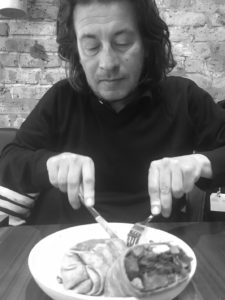 “I believe in the conversation,” he said. “We should talk about it. If we keep silent, if we keep quiet, the fascists won. I’m happy to open conversations.”
“I believe in the conversation,” he said. “We should talk about it. If we keep silent, if we keep quiet, the fascists won. I’m happy to open conversations.”
This isn’t a foreign film, even though it’s set in a foreign country. This isn’t an art house movie, even though an art house nerd would swear it was shot by Nestor Almendros. This is a great movie.
At the beginning of the conversation, back at The Palmer House, when we first got in my car, I was using my iPhone for directions, so I couldn’t record the conversation, which got increasingly frustrating. So I pulled the car over, turned off the directions and began recording.
Ferenc was rolling.
 “It was a fact,” he said. “It was a real historical fact. Of course our movie is a fiction but we got a lot of research and we want to show a true story or a kind of a true story. After the war, there was some discounted auctions for Jewish property. We recognize a lot of archives, photos and everything, how they tied the simple people to the crime legally. You know? You get a house from ten percent of the real price and that’s how the politicians manipulate the responsibility and push it to the people.”
“It was a fact,” he said. “It was a real historical fact. Of course our movie is a fiction but we got a lot of research and we want to show a true story or a kind of a true story. After the war, there was some discounted auctions for Jewish property. We recognize a lot of archives, photos and everything, how they tied the simple people to the crime legally. You know? You get a house from ten percent of the real price and that’s how the politicians manipulate the responsibility and push it to the people.”
We’re all in this together. We’re all guilty, to one degree or another. Maybe you didn’t casually leave an assault weapon lying around the house, but did you march with the kids from Parkland? Maybe you’re not a womanizer, but have you given a second thought to how you treat women at work? Maybe you don’t fly the Confederate Flag, but have you walked through the African American Museum of History and Culture in Washington DC and stood in line to view the child coffin of Emmett Till? Maybe you’re Jewish and you’ve seen one too many holocaust movies, but have you stopped think about what life must have been like in 1945?
 “Yeah, so,” Ferenc began. “When we model the society of course we focus for this mafia, the clerk and the police and the religious triangle, it’s a black and white movie but the thinking of the society is not black and white. We want to try to show some shades of the people. For example the wife of the clerk who escapes as a morphine addict or the other guy who escapes as a drunk. So this is a destroyed society of people who want to help or who want to tell the truth but they can’t and so instead they destroy themselves. You know? So of course is not easy because the collaboration in the society is not the same level because who are in the top is much more involved to the crime and the deportation.
“Yeah, so,” Ferenc began. “When we model the society of course we focus for this mafia, the clerk and the police and the religious triangle, it’s a black and white movie but the thinking of the society is not black and white. We want to try to show some shades of the people. For example the wife of the clerk who escapes as a morphine addict or the other guy who escapes as a drunk. So this is a destroyed society of people who want to help or who want to tell the truth but they can’t and so instead they destroy themselves. You know? So of course is not easy because the collaboration in the society is not the same level because who are in the top is much more involved to the crime and the deportation. 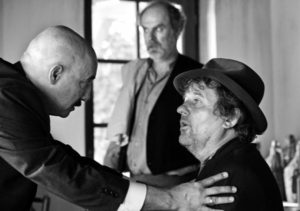 Of course, in the deportation, the police and the rail guys are much more involved than the house people. But in the end, the house people are also involved in this property question. And, so, you know, is really complex. And sometimes people who don’t like the movie say it’s a Jewish movie. But I think is not.”
Of course, in the deportation, the police and the rail guys are much more involved than the house people. But in the end, the house people are also involved in this property question. And, so, you know, is really complex. And sometimes people who don’t like the movie say it’s a Jewish movie. But I think is not.”
I agree. I think is not.
“Back to the question of the smoke. Everybody knows what means this smoke, of course, the gas chambers. But it also means the smoke is here in the present time,” he said “The smoke is not disappeared.”
What is the smoke? What is Ferenc talking about in broken English.
 Is it Stormy Donald, hanging over everything, where every single day there are so many things coming at you it’s impossible to know which thing to worry about the most. Is it Animal Assad, we’re told he didn’t gas his own people, but you just know in your bones chemical weapons are Assad’s favorite plaything. Is it Little Rocket Man with his big military parades. Is it Pee-Pee Putin, meddling in the election, using racist language to describe Barack Obama that I will not use, even though my Grandpa Bernie used the same racist language and I loved him. Maybe that’s the smoke, recognizing within yourself how you’ve been taught things by the people you love which you must learn how to let go of before you can live in the moment by recognizing how easily you could be on the wrong side of the smoke, on the wrong side of history.
Is it Stormy Donald, hanging over everything, where every single day there are so many things coming at you it’s impossible to know which thing to worry about the most. Is it Animal Assad, we’re told he didn’t gas his own people, but you just know in your bones chemical weapons are Assad’s favorite plaything. Is it Little Rocket Man with his big military parades. Is it Pee-Pee Putin, meddling in the election, using racist language to describe Barack Obama that I will not use, even though my Grandpa Bernie used the same racist language and I loved him. Maybe that’s the smoke, recognizing within yourself how you’ve been taught things by the people you love which you must learn how to let go of before you can live in the moment by recognizing how easily you could be on the wrong side of the smoke, on the wrong side of history.
See this movie. Go out of your way to see this movie. Share it with a friend. You can’t know 2018 until you experience “1945.”